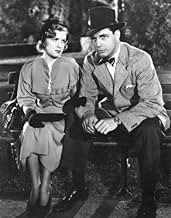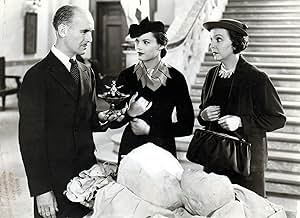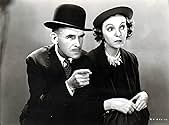A priceless Cellini silver cup is stolen from a local museum with both Hildegarde and Oscar on the case.A priceless Cellini silver cup is stolen from a local museum with both Hildegarde and Oscar on the case.A priceless Cellini silver cup is stolen from a local museum with both Hildegarde and Oscar on the case.
- Director
- Writers
- Stars
Alyce Ardell
- Josephine, Hildegarde's Maid
- (uncredited)
John T. Bambury
- Midget
- (uncredited)
Billy Dooley
- Gas Station Attendant
- (uncredited)
Frank Fanning
- Detective Fanning
- (uncredited)
Mary Gordon
- Woman with Bag
- (uncredited)
Reed Howes
- Museum Guard in Egyptian Room
- (uncredited)
John Indrisano
- Man in Line for Inspection
- (uncredited)
- Director
- Writers
- All cast & crew
- Production, box office & more at IMDbPro
6.3493
1
2
3
4
5
6
7
8
9
10
Featured reviews
Zasu Pitts a respectable Hildegarde Withers
We did not know that Hildegarde Withers plays golf, but our first view of Zasu Pitts in the role shows her practicing her swing (indoors, no less). It seems she had a golf date with her good friend, Inspector Oscar Piper, which he has unfortunately broken: a case has come up, and Miss Withers—quickly recovering from her irritation at being stood up—hastens to the scene to assist in the investigation.
James Gleason is Inspector Piper once again, and gives his usual entertaining performance as the irascible detective with a soft spot for the school teacher who follows him around offering unsolicited crime-solving advice. Zasu Pitts as Withers delivers the usual dry Withers comments and is true to the character in her impatience with fools. (A policeman mistakenly arrests and handcuffs her, then tells her anything she says may be used against her, to which she replies, "Anything I say may be used against YOU—and that'll be plenty if you don't unshackle me at once!") Pitts looks good in the role, and she and Gleason make a snappy team. Considering that this was Gleason's fifth film in his role but Pitts was brand new to hers, the interaction between the two is impressively smooth.
The plot involves the murder of one John Carter, who is shot dead in a parked roadster a mere moment after attempting to kiss a girl who didn't want to be kissed and then laughing at her. Suspects abound, of course; complicating the plot is a possible case of mistaken identity, as various characters were out and about, tailing and being tailed, at the time of the murder. Why again was the body dragged from the roadster and (eventually) deposited in the murdered man's own library? --The plot does indeed thicken.
A solid supporting cast includes James Donlan as a goofy cop with an interest in astrology; Paul Fix as a nervous chauffeur; and Louise Latimer, who had just played a different role (but a similar character) in the Withers mystery immediately preceding this one.
No classic, but certainly an entertaining hour for those of us who enjoy this kind of thing: great character actors, some good dialog, and a plot that's a bit more complicated than really necessary.
James Gleason is Inspector Piper once again, and gives his usual entertaining performance as the irascible detective with a soft spot for the school teacher who follows him around offering unsolicited crime-solving advice. Zasu Pitts as Withers delivers the usual dry Withers comments and is true to the character in her impatience with fools. (A policeman mistakenly arrests and handcuffs her, then tells her anything she says may be used against her, to which she replies, "Anything I say may be used against YOU—and that'll be plenty if you don't unshackle me at once!") Pitts looks good in the role, and she and Gleason make a snappy team. Considering that this was Gleason's fifth film in his role but Pitts was brand new to hers, the interaction between the two is impressively smooth.
The plot involves the murder of one John Carter, who is shot dead in a parked roadster a mere moment after attempting to kiss a girl who didn't want to be kissed and then laughing at her. Suspects abound, of course; complicating the plot is a possible case of mistaken identity, as various characters were out and about, tailing and being tailed, at the time of the murder. Why again was the body dragged from the roadster and (eventually) deposited in the murdered man's own library? --The plot does indeed thicken.
A solid supporting cast includes James Donlan as a goofy cop with an interest in astrology; Paul Fix as a nervous chauffeur; and Louise Latimer, who had just played a different role (but a similar character) in the Withers mystery immediately preceding this one.
No classic, but certainly an entertaining hour for those of us who enjoy this kind of thing: great character actors, some good dialog, and a plot that's a bit more complicated than really necessary.
For once, a mystery film where the leading detective is NOT an idiot!
Back in the 1930s, Edna May Oliver played amateur detective Hildegarde Withers in several very successful films. Unfortunately, when Miss Oliver went to MGM to work, this left a vacancy. RKO/Radio Pictures didn't want to discontinue the series and they tried a couple actresses in the role...though none were as good as Oliver. In "The Plot Thickens", they tried out Zazu Pitts in the lead...and they apparently liked her enough to have her appear once more time as the detective.
Soon after the story begins, a man is shot. Was he the victim of a jealous boyfriend? It appears this way. However, through the course of the picture, it becomes obvious that the victim was a jerk...and had something to do with the theft of a valuable piece of art, the Cellini Cup.
I liked this film for many reasons. Much of it was because the film had lots of false leads that kept you guessing. And, much was because the detective (James Gleason) investigating the case was NOT an idiot and often made smart moves. So, instead of Hildegarde saving the day and constantly out-thinking the cops, she was more an assistant to an already capable guy...which made this much unlike the average B-mystery. Well worth seeing...even without Oliver.
Soon after the story begins, a man is shot. Was he the victim of a jealous boyfriend? It appears this way. However, through the course of the picture, it becomes obvious that the victim was a jerk...and had something to do with the theft of a valuable piece of art, the Cellini Cup.
I liked this film for many reasons. Much of it was because the film had lots of false leads that kept you guessing. And, much was because the detective (James Gleason) investigating the case was NOT an idiot and often made smart moves. So, instead of Hildegarde saving the day and constantly out-thinking the cops, she was more an assistant to an already capable guy...which made this much unlike the average B-mystery. Well worth seeing...even without Oliver.
Hilarious dry humor!
I saw this movie for the first and only time in the late '80's on AMC and have been searching for it to purchase ever since. My son, who was then 6 years old, and I laughed and chuckled throughout the movie at the dry wit, sarcasm and humor. You have to pay attention, because like many other movies of this era, there is a plot (!!) and a true storyline and you have to be listening to catch the sometimes subtle humor, particularly between Gleason's and Pitts' characters. My kids grew up on these old B&W's and can't understand why their friends don't find them entertaining. Since it's not a "splash & gash" movie of today, with no storyline and only loud music and special effects, most young people (and many adults) today would no doubt find it boring. It's not "Arsenic & Old Lace" or "The Maltese Falcon", but it's a very funny old B&W and I have every intention of purchasing it ASAP!
Caught in an Eddy
Its a cliché, I know. But they don't make them like this any more.
And that's for a good, a very good reason: people wouldn't watch them, even those like myself who really value these.
What I'm talking about here are the comedy-mysteries that were pumped out in the 30s like TeeVee shows are now. Many of the same production values are used, in terms of economy and lack of depth. As with TeeVee stuff, the value is partially in the accretion of many similar movies -- in seeing one, you see some harmonization with hundreds of others.
We couldn't make these today because the genre was occluded by noir so far as the tone and by the hardboiled detective so far as story. These have not only changed movies, but the way we think.
So visiting these little films are somewhat like seeing that part of old London that's been turned into a theme park for tourists: something with a nostalgic. uncomplicated charm.
Of these, you cannot do better than James Gleason and the Hildegarde Winters things. These actually have a plot just complex enough to remind you that there is one. It doesn't "play fair" in that the complete solution uses knowledge the audience doesn't have. But in all these, the partial solution is telegraphed early.
I admit, I like the Hildegarde as portrayed by Edna Mae Oliver better in some regards. She's a more memorable character, and the notion of Gleason falling in love with her is as precious a joke as you can find.
But Zasu's got much better comic timing, so this has better jokes verbally.
Watch these, or something like them -- just like you might visit a "restored area" -- because such journeys are necessary to understanding film.
Ted's Evaluation -- 2 of 3: Has some interesting elements.
And that's for a good, a very good reason: people wouldn't watch them, even those like myself who really value these.
What I'm talking about here are the comedy-mysteries that were pumped out in the 30s like TeeVee shows are now. Many of the same production values are used, in terms of economy and lack of depth. As with TeeVee stuff, the value is partially in the accretion of many similar movies -- in seeing one, you see some harmonization with hundreds of others.
We couldn't make these today because the genre was occluded by noir so far as the tone and by the hardboiled detective so far as story. These have not only changed movies, but the way we think.
So visiting these little films are somewhat like seeing that part of old London that's been turned into a theme park for tourists: something with a nostalgic. uncomplicated charm.
Of these, you cannot do better than James Gleason and the Hildegarde Winters things. These actually have a plot just complex enough to remind you that there is one. It doesn't "play fair" in that the complete solution uses knowledge the audience doesn't have. But in all these, the partial solution is telegraphed early.
I admit, I like the Hildegarde as portrayed by Edna Mae Oliver better in some regards. She's a more memorable character, and the notion of Gleason falling in love with her is as precious a joke as you can find.
But Zasu's got much better comic timing, so this has better jokes verbally.
Watch these, or something like them -- just like you might visit a "restored area" -- because such journeys are necessary to understanding film.
Ted's Evaluation -- 2 of 3: Has some interesting elements.
Pitts takes over as Hildegarde Withers
From 1936, The Plot Thickens sure does - it starts as one thing and ends as another. James Gleason and Zasu Pitts star in this Hildegarde Withers mystery.
A man, John Carter (Richard Tucker) is found deceased in his study by his butler (Arthur Aylesworth). Inspector Oscar Piper (James Gleason) is called in and summons Hildegarde Withers (Pitts), who always has interesting deductions.
There are a few suspects. One is Alice Stevens. Another is her boyfriend, Robert Wilkins, who was seen arguing with Carter by the cop who patrols the park. There was also a Frenchman seen speaking with Carter.
The mystery deepens, as the murder seems mixed up with valuable museum pieces that have been stolen.
As Hildegarde, Pitts comes off as a little dizzy, but she doesn't miss a trick, is very self-sufficient, and works well with Gleason, who plays a smart cop.
There are some twists and turns, making this an enjoyable mystery.
A man, John Carter (Richard Tucker) is found deceased in his study by his butler (Arthur Aylesworth). Inspector Oscar Piper (James Gleason) is called in and summons Hildegarde Withers (Pitts), who always has interesting deductions.
There are a few suspects. One is Alice Stevens. Another is her boyfriend, Robert Wilkins, who was seen arguing with Carter by the cop who patrols the park. There was also a Frenchman seen speaking with Carter.
The mystery deepens, as the murder seems mixed up with valuable museum pieces that have been stolen.
As Hildegarde, Pitts comes off as a little dizzy, but she doesn't miss a trick, is very self-sufficient, and works well with Gleason, who plays a smart cop.
There are some twists and turns, making this an enjoyable mystery.
Did you know
- TriviaJohn Carter (Richard Tucker) drives a revolutionary new 1937 Cord 812 roadster, owned by RKO and used in several other of their productions, such as Super-Sleuth (1937), in which it's driven by Jack Oakie as film star Willard (Bill) Martin. As usual, the police drive a more traditional and more conventional 1936 Ford sedan.
- GoofsThe Italian couple that Officer Cassidy talks to near the beginning of the movie say "good night" to him in Spanish.
- Quotes
Hildegarde Withers: Now don't behave more stupid than is natural, Oscar.
- ConnectionsFollowed by Forty Naughty Girls (1937)
- SoundtracksPretty Baby
Music by Egbert Van Alstyne and Tony Jackson
Lyrics by Gus Kahn
Played by the organ grinder in the park
Details
- Release date
- Country of origin
- Language
- Also known as
- The Riddle of the Dangling Pearl
- Filming locations
- Production company
- See more company credits at IMDbPro
- Runtime
- 1h 9m(69 min)
- Color
- Aspect ratio
- 1.37 : 1
Contribute to this page
Suggest an edit or add missing content








































